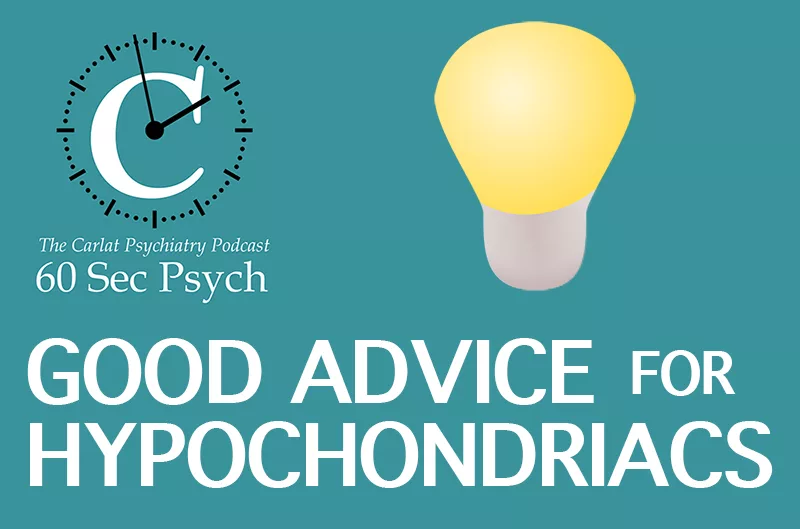Today’s study was a randomized controlled trial comparing a self-guided online therapy to face-to-face CBT for health anxiety. Even if you’re not a therapist, stay tuned for a practical take-away at the end.
Published on: 5/30/2020
Duration: 2 minutes, 10 seconds
Transcript:
The study enrolled 204 patients with hypochondriasis. Actually, they did not have hypochondriasis, because that word is no longer in the DSM ─ it’s been divided into somatic symptom disorder, where there’s symptoms PLUS excess anxiety about illness, and illness anxiety disorder, where there’s just excessive anxiety about illness.
The bottom line: Internet-based therapy worked just as well as in-person CBT. This wasn’t teletherapy ─ it was an educational website with CBT exercises and minimal feedback from a real therapist by email. And that website becomes available to all, here are the top techniques you can start using today:
1) Teach mindfulness. Have the patient practice it 10 minutes a day. UCLA has a mindfulness podcast, and last Fall we featured an interview on the top mental health apps that has other suggestions.
2) Response prevention. Ask them to limit their reassuring behavior, such as “I will check my pulse no more than 5 times a day” or insert a pause like “I will wait at least 30 minutes before inspecting my skin in the mirror when I get the urge to do so.” Have them practice this daily and track their progress. The full therapy used exposure exercises, like watching a film about a deadly disease, but I’d wait on that ─ exposure is best done in regular therapy. The other 2 steps should be helpful for anyone who is anxious about their health, which these days may include all of us.
Axelsson E, Andersson E, Ljótsson B, Björkander D, Hedman-Lagerlöf M, Hedman-Lagerlöf E. Effect of internet vs face-to-face cognitive behavior therapy for health anxiety: A randomized noninferiority clinical trial. JAMA Psychiatry. 2020;e200940. doi:10.1001 [Link]
Published on: 5/30/2020
Duration: 2 minutes, 10 seconds
Transcript:
The study enrolled 204 patients with hypochondriasis. Actually, they did not have hypochondriasis, because that word is no longer in the DSM ─ it’s been divided into somatic symptom disorder, where there’s symptoms PLUS excess anxiety about illness, and illness anxiety disorder, where there’s just excessive anxiety about illness.
The bottom line: Internet-based therapy worked just as well as in-person CBT. This wasn’t teletherapy ─ it was an educational website with CBT exercises and minimal feedback from a real therapist by email. And that website becomes available to all, here are the top techniques you can start using today:
1) Teach mindfulness. Have the patient practice it 10 minutes a day. UCLA has a mindfulness podcast, and last Fall we featured an interview on the top mental health apps that has other suggestions.
2) Response prevention. Ask them to limit their reassuring behavior, such as “I will check my pulse no more than 5 times a day” or insert a pause like “I will wait at least 30 minutes before inspecting my skin in the mirror when I get the urge to do so.” Have them practice this daily and track their progress. The full therapy used exposure exercises, like watching a film about a deadly disease, but I’d wait on that ─ exposure is best done in regular therapy. The other 2 steps should be helpful for anyone who is anxious about their health, which these days may include all of us.
Axelsson E, Andersson E, Ljótsson B, Björkander D, Hedman-Lagerlöf M, Hedman-Lagerlöf E. Effect of internet vs face-to-face cognitive behavior therapy for health anxiety: A randomized noninferiority clinical trial. JAMA Psychiatry. 2020;e200940. doi:10.1001 [Link]
Got feedback? Take the podcast survey.


_-The-Breakthrough-Antipsychotic-That-Could-Change-Everything.webp?t=1729528747)



